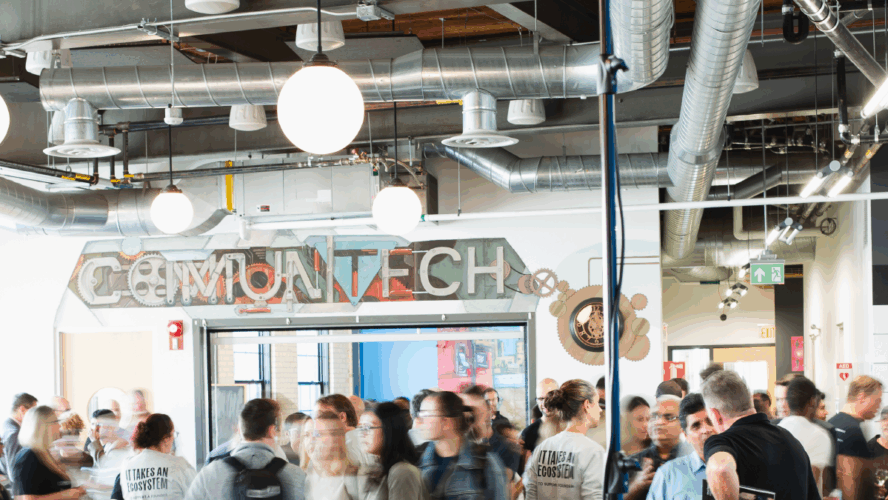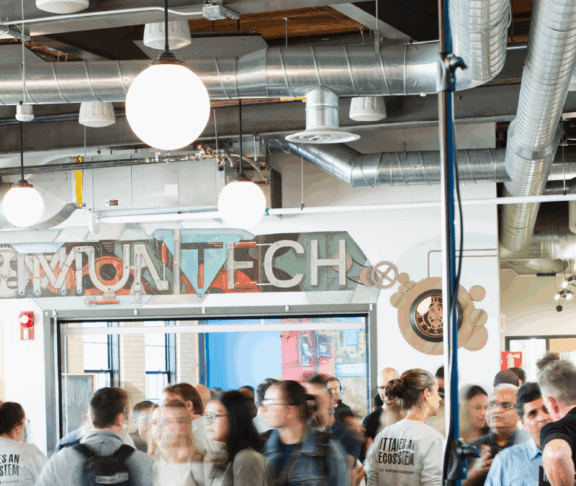
Sheldon McCormick
CEO,
Communitech
With startups solving problems, partners who pilot early, and a community that keeps building, Waterloo Region is showing the rest of Canada what’s possible in times of uncertainty.
When an engine stalls, most people call for a tow. In Waterloo Region, we build a new one.
That’s what I found when my family moved to the region two years ago, and what I now see every day as CEO of Communitech. Resilience is something this community believes in and builds.
Waterloo Region has reinvented itself more than once, through industry collapse, a global pandemic, and the rise and fall of tech giants. Every time, it comes back stronger. And in a world facing constant disruption, that kind of durability is something Canada can’t afford to ignore.
The roots of resilience
Long before tech, Kitchener and Waterloo were industrial engines and manufacturing towns. Originally known as a manufacturing district built on textiles, rubber, buttons and furniture, this area once powered much of Canada’s economy. The very building Communitech now calls home – the Tannery in downtown Kitchener – was once the largest leather-tanning facility in the British Empire. When those industries faded, the region didn’t fold. It retooled by leaning into engineering, education and entrepreneurship.
When BlackBerry’s smartphone era ended and the company downsized its operations in Waterloo, it sent shockwaves through the local economy. The community responded by betting on startups. It was a time of economic survival, but also the beginning of a new identity.
When COVID-19 brought the world to a halt, local companies pivoted overnight to produce PPE, deploy autonomous robots, and build AI tools for hospitals.
What resilience looks like today
After nearly 15 years in Toronto’s tech scene, my wife and I moved to Waterloo in search of more space, a deeper community connection and a place to raise our young family. What we found was a region built on connection, ambition and action.
With more than 1,570 tech companies and nearly 30,000 tech workers – representing over nine per cent of the local workforce – Waterloo punches well above its weight. It’s home to global leaders in AI, robotics, cleantech, fintech and advanced manufacturing. CBRE has ranked it the number-one small tech talent market in North America four years in a row.
It’s also one of the most interconnected ecosystems I’ve ever seen. There’s something powerful about catalyzing the energy of a local network where people genuinely want to support one another. And that density leads to action.
When nanotech firm Alchemy developed a military-grade coating to reduce infrared detection, the Canadian Armed Forces tested it in the field. When MedInclude, a Waterloo medtech startup, wanted to pilot its AI-based communication tool, Grand River Hospital opened its doors. When AI startup ConeLabs developed its aerial inspection platform, utility companies became customers, collaborators and early adopters. And when Real Life Robotics launched autonomous delivery robots, municipalities like Kitchener partnered to pilot them.
When founders faced new tariffs, rising interest rates, or changing global regulations, we rolled up our sleeves. Our team worked directly with founders, trade experts, and policy advisors to help startups adjust on the fly, whether that meant changing suppliers or exploring new markets.
A blueprint for Canada’s future
My own journey has been shaped by growth, pressure, and constant change. These are conditions every founder knows well. Just like in a video game, the challenges get tougher at every stage.
At Uber, I helped scale operations across Canada while facing fast-changing regulatory landscapes. At Properly, I co-founded a real estate tech company that grew to over $30 million in annual revenue and $1.5 billion in transactions.
Now, at Communitech, my job is to help others build and build to last. I want Communitech to be described as a founder-led movement. As employees, we’re the supporting cast and the infrastructure that supports and amplifies our community.
My early focus has been on listening to founders, tech teams, public partners and peers. One theme that’s already clear is that AI keeps accelerating and founders are racing to keep up. It’s changing both what we build by redefining business models and how we build companies. It’s a tool that can be applied across nearly every industry and company function.
We’re already seeing that in Waterloo Region. Companies like DarwinAI are helping manufacturers optimize quality control using explainable AI. Auvik is scaling its network management software globally with AI-driven visibility and automation. And Faire uses AI to help small retailers find the right products for their shops, get personalized recommendations and access credit more easily. Behind the scenes, AI also helps keep things running smoothly, like picking the best product photos and spotting sales trends, so brands and retailers can focus on growing their business.
What Canada can learn
Canada doesn’t need another white paper on innovation. It needs proof points. It needs playbooks. It needs communities that already know how to rebound and are already helping startups scale faster, safer and smarter.
That’s what you find in Waterloo Region.
A region that values substance over flash. Founders who build through uncertainty. Partners who show up early. A support system that responds quickly and doesn’t flinch in a crisis.
If we want a more resilient national economy, we don’t need to start from scratch. We need to scale what’s working.
If you’re looking to build something that lasts, in a community that’s built to last, join us at Communitech. We’re here for the long haul, and for the builders who are too.
To learn more, visit communitech.ca.
Sponsored by Communitech.


